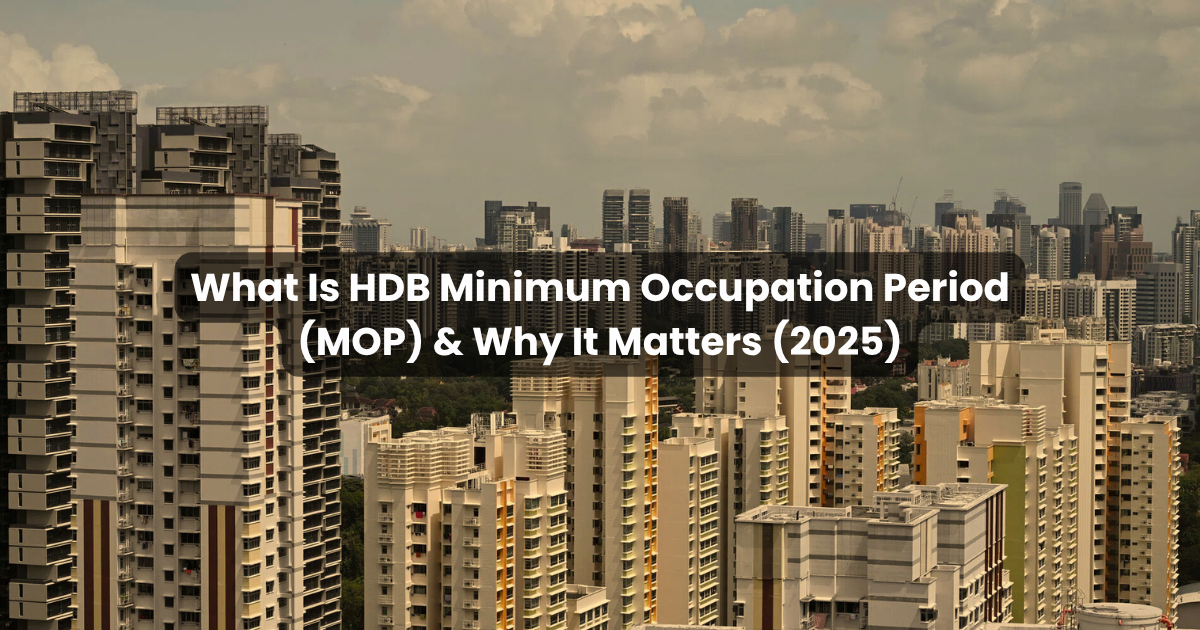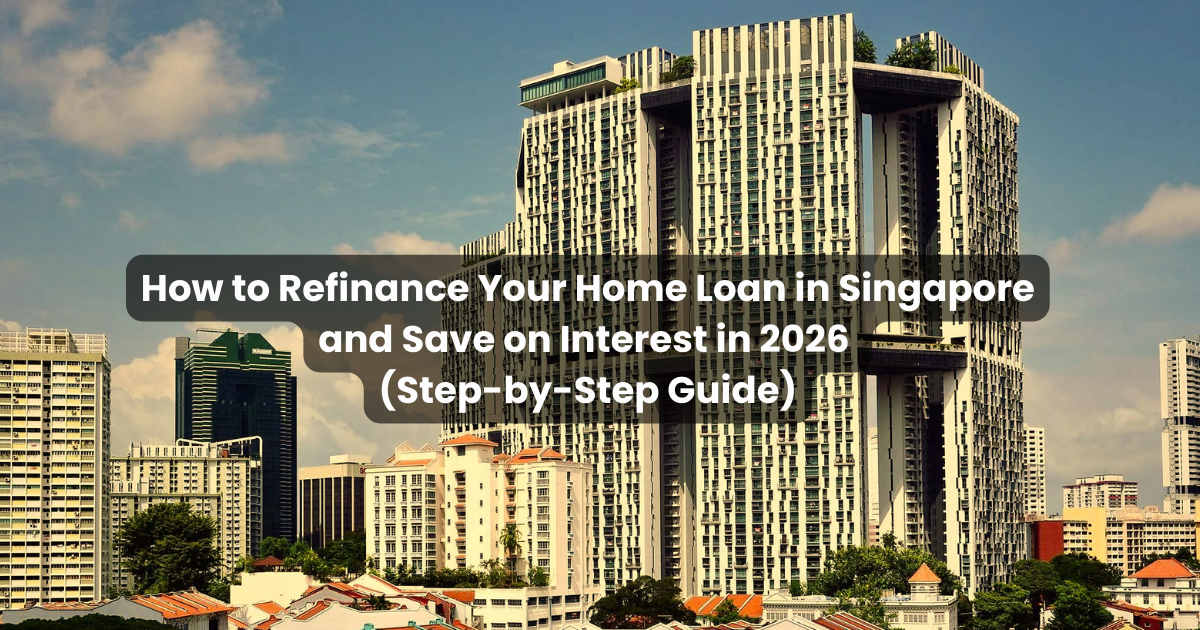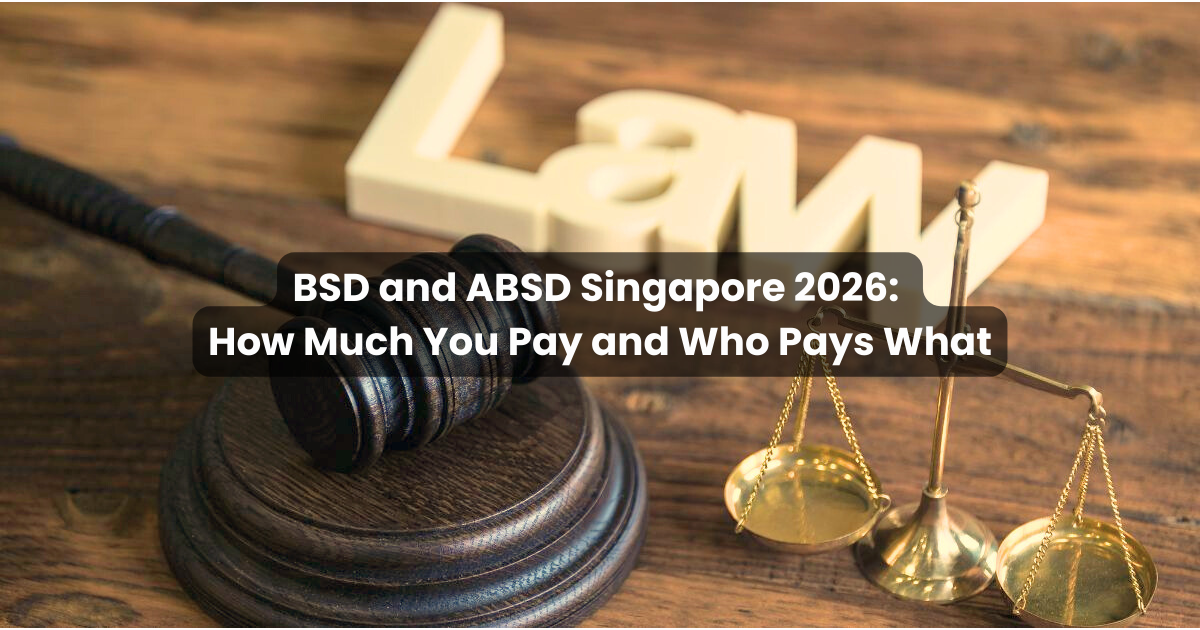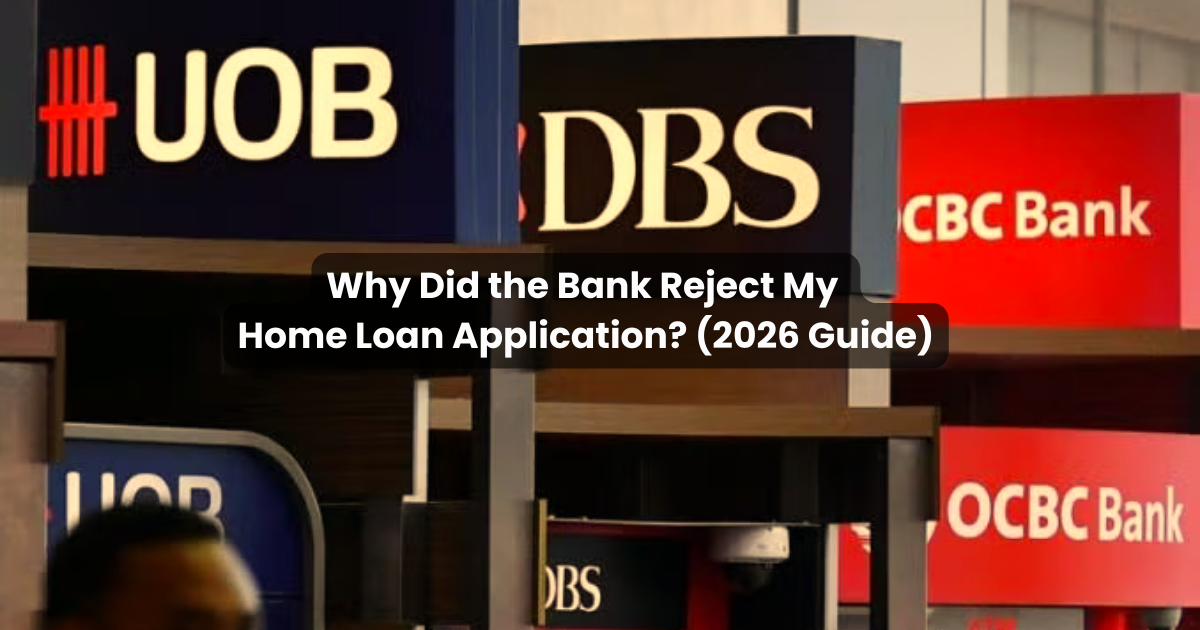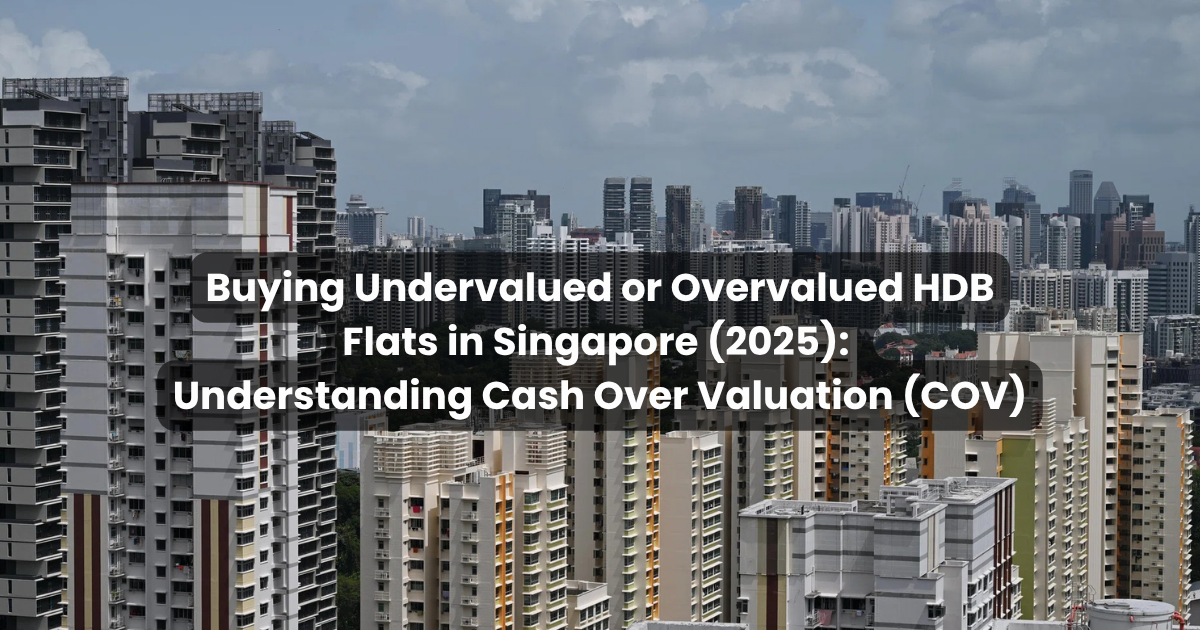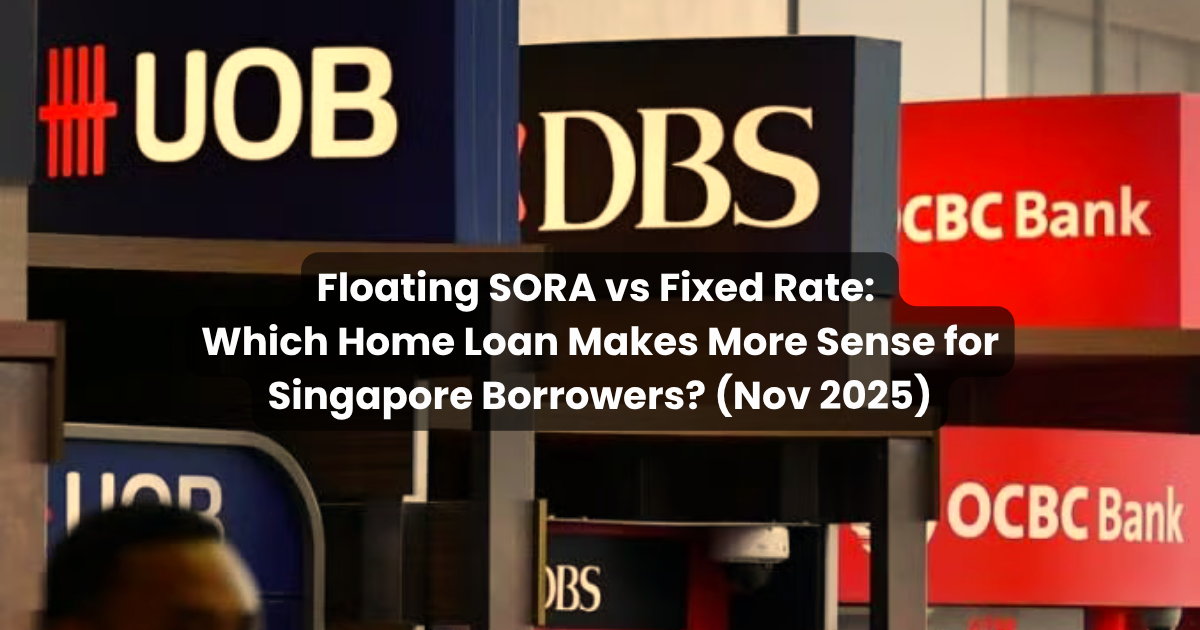- Insights & Updates
Latest News
By Chief Analyst
October 9, 2025For many Singaporeans, buying a Housing & Development Board (HDB) flat marks a major milestone in their journey toward homeownership. Yet one of the most misunderstood rules in public housing is the Minimum Occupation Period, or MOP.
This rule determines when you can sell, rent, or own another property. It is fundamental to Singapore’s housing framework because it ensures that subsidised public flats remain homes first, and not speculative assets.
In this article, we explain what the MOP is, why it exists, how it is calculated, and what happens if you breach it. We also explore several real-life penalty cases where homeowners faced serious consequences for ignoring or misunderstanding MOP regulations.
What Exactly Is the MOP?
The Minimum Occupation Period (MOP) refers to the minimum number of years an HDB flat owner must physically occupy their flat before being allowed to sell it in the open market or rent out the entire unit.
The MOP ensures that public housing fulfils its core social purpose, providing affordable, owner-occupied homes for Singaporeans rather than serving as a short-term investment vehicle.
Simply put: until the MOP is fulfilled, your HDB flat must remain your primary residence.
How Long Is the MOP?
The MOP length depends on how and when the flat was bought. For most flats, it is five years, but some categories carry longer restrictions:
- New BTO or Sale of Balance Flats: Five years from the date of key collection.
- Resale Flats Purchased with CPF Housing Grants: Five years from the resale completion date.
- Prime Location Public Housing (PLH) Flats: Ten years from key collection.
- Executive Condominiums (ECs): Five-year MOP before sale to Singapore Citizens or PRs; ten years before full privatisation.
The clock starts ticking from the day you collect your keys (for new flats) or complete your purchase (for resale units). However, the MOP “pauses” if you are not living in the flat, for instance, if you relocate overseas.
Why the MOP Exists
The MOP underpins HDB’s philosophy that public housing should be for genuine owner-occupation. It deters speculative behaviour and stabilises resale prices.
Without it, heavily subsidised flats could be flipped quickly for profit, inflating prices for future buyers and undermining fairness in the allocation of housing grants.
Moreover, the MOP helps preserve social stability in HDB towns by ensuring a base of long-term residents who form communities rather than transient renters. In high-demand estates, particularly under the Prime Location Public Housing (PLH) model, the MOP is extended to ten years to reinforce this objective.
What You Can and Cannot Do During the MOP
During the MOP, homeowners must reside in their flat. You cannot sell the flat on the open market, rent out the entire unit, or buy another private property, whether in Singapore or overseas.
You may, however, rent out individual rooms if you continue to live in the flat. This allows some flexibility for families or singles to offset their mortgage payments.
Temporary absences (for overseas postings or caregiving duties) can be approved on a case-by-case basis, but the MOP clock will pause during that period.
What Happens After the MOP Ends
Once the MOP is over, you are free to:
- Sell your HDB flat in the open market.
- Rent out the entire unit (with HDB approval).
- Purchase a private property while retaining your HDB.
Many Singaporeans take this milestone as an opportunity to upgrade to private property or buy a second home for investment. However, additional financial rules such as the Total Debt Servicing Ratio (TDSR) and Additional Buyer’s Stamp Duty (ABSD) will still apply.
Read more on Renting out HDB Flats
Penalties for Violating MOP Rules
Breaching the MOP is a serious offence. HDB has the authority to:
- Compulsorily acquire the flat (force sale).
- Recover housing grants and subsidies with interest.
- Disqualify the owner from future housing subsidies or BTO applications.
- Issue financial penalties or public warnings for minor breaches.
The following real-world examples illustrate just how seriously HDB treats MOP enforcement.
Case Example 1: Renting Out Entire Flat Before MOP
In one reported case, an HDB owner in Punggol was found to have rented out his entire flat on property portals while claiming to live there. Neighbours noticed frequent changes in occupants and alerted HDB.
Investigations revealed that the owner had not fulfilled his five-year MOP and had received housing grants. HDB repossessed the flat and required the owner to refund all grants with accrued CPF interest.
This case highlights that renting out the entire unit before MOP expiry, regardless of intent, constitutes a clear violation of the rules.
Case Example 2: Buying Private Property Before MOP Ends
Another breach occurs when owners purchase private property before completing their MOP. HDB rules prohibit this because public housing is meant for owner-occupation during the MOP period.
In 2023, an owner who bought a condominium in 2022, while still within his HDB’s MOP, was investigated after transferring his residential address. HDB concluded that the flat was no longer occupied by the owner and imposed a financial penalty, revoked his eligibility for future grants, and forced him to sell one of the properties.
Case Example 3: Fake Occupation and Misuse of Address
In a Tampines case, owners claimed to live in their flat but were found to be residing overseas while tenants occupied the entire unit. Utility records revealed low water and power usage consistent with non-occupation, while rent payments were being made through a third party.
HDB officers eventually conducted an inspection and confirmed the breach. The flat was compulsorily acquired, and the owners forfeited a portion of their resale value.
This case shows how HDB uses utility data, immigration records, and even digital footprints to identify fraudulent occupancy.
Case Example 4: Listing Property for Sale Before MOP
Another frequent mistake involves owners advertising their flat for sale before fulfilling the MOP. Many believe that simply listing early, without completing a sale, is harmless. However, HDB treats premature marketing as evidence of intent to sell, which violates the MOP requirement of continuous occupation.
In one case, a BTO owner who collected his keys in 2021 listed his 4-room flat online in early 2025, a few months before the MOP expiry. Thinking it would “save time” to find buyers early, he posted photos, pricing, and agent details on a major property portal.
The listing was flagged to HDB, and the owner was promptly investigated. Though no transaction had occurred, the act of marketing the unit was enough to constitute a breach of regulations. HDB issued a stern warning and required immediate removal of the listings. Had a sale proceeded, he could have faced financial penalties, forfeiture of grants, or even flat reacquisition.
HDB has since reiterated that owners must wait until the official MOP end date before engaging agents or advertising their property. Even informal marketing through social media or word-of-mouth, if paired with pricing or sales intent, can trigger enforcement action.
This case underscores how strict HDB is about maintaining the spirit of the rule: the MOP is not merely about the transaction date, but about preventing premature speculation and maintaining fairness in the resale market.
The Financial Consequences of Losing Your Flat
When HDB reacquires a flat, the financial loss can be devastating. Owners are typically refunded only the original purchase price, less any housing grants or subsidies received.
For example, if a flat purchased for $400,000 now has a market value of $600,000, HDB’s reacquisition would yield the owner only $400,000, resulting in a $200,000 loss in potential equity. Housing grants such as the CPF Housing Grant or Enhanced CPF Grant must also be repaid with accrued interest to CPF, further reducing proceeds.
This outcome reinforces the costliness of MOP violations, far outweighing any short-term rental or resale gains.
The Broader Lessons from Enforcement
These cases collectively reveal several truths about MOP compliance. First, HDB actively enforces the rules using modern surveillance tools such as data analytics, online monitoring, and collaboration with other agencies. Public complaints are also taken seriously.
Second, even minor infractions such as pre-listing or partial non-occupation can result in warnings, penalties, or reputational harm.
Third, the system’s strictness ensures that subsidised housing remains affordable for genuine homeowners. It maintains public trust, stabilises prices, and prevents speculative cycles that could hurt first-time buyers.
Special Exceptions
HDB may grant early approval to sell or rent out a flat before MOP completion under exceptional circumstances such as divorce, death of an owner, financial hardship, or permanent relocation overseas. Each case is reviewed individually, and documentary evidence must be provided.
However, these exemptions are rare. HDB’s default stance is that all owners must honour the occupation period, and early disposal is permitted only when keeping the flat is genuinely impractical.
How to Check Your MOP Status
Homeowners can verify their MOP easily via My HDBPage using Singpass. Under My Flat > Purchased Flat > Flat Details, the portal displays both the start and end dates of the MOP.
It’s crucial to confirm your MOP expiry before marketing or renting your flat. Even accidental early listings or advertisements can lead to investigations, as seen in Case Example 4.
Practical Tips
If your MOP is ending soon, plan ahead but proceed carefully. Begin monitoring the market six months prior, but avoid engaging agents or signing any documents until the MOP officially lapses. For those considering upgrading to a private property, consult your mortgage adviser early to ensure that TDSR, ABSD, and financing timelines align.
For owners unsure about their situation such as overseas assignments or shared ownership, always obtain written clarification from HDB before acting. Transparency and documentation go a long way in avoiding penalties.
Conclusion
The Minimum Occupation Period is not a mere administrative hurdle; it is a cornerstone of Singapore’s housing policy. By ensuring that public flats remain primarily for owner-occupation, it preserves the affordability and integrity of HDB housing.
Violating the rule can have severe consequences: forced resale, grant repayment, or permanent ineligibility for future schemes. The lesson is simple: patience pays. Once your MOP ends, you will gain the freedom to sell, rent, or invest responsibly without risking your home or your future.
Understanding and respecting the MOP is the best way to protect both your property and your long-term financial stability.
Explore related content by topic
What is Cash Over Valuation (COV)? Buying Overvalued HDB Flats in Singapore (2025)
In 2025, Singapore’s resale HDB buyers must understand whether they’re paying fair value and how COV (Cash-Over-Valuation) impacts affordability. This guide explains how to identify undervalued and overvalued flats, assess fair prices, and navigate COV confidently to make smarter, financially sound property decisions.
Floating SORA vs Fixed Rate: Which Home Loan Makes More Sense for Singapore Borrowers? (Nov 2025)
At Fairloan, our view is clear: enjoy today’s low rates, whether floating or fixed, and stay flexible. Through 2026, costs should remain stable. The key move comes end-2026 to early-2027 when borrowers should consider locking a longer fixed term such as 3-5years for protection and certainty beyond 2027.

